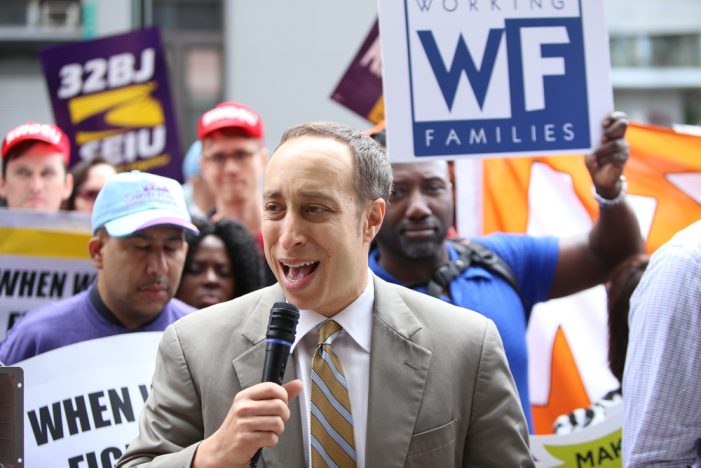By Chris Tobias | Editorial credit: a katz / shutterstock.com | Photo of Bill Lipton of NY Working Families
The Working Families Party (WFP), established in 1998, has been a significant force in New York politics, advocating for progressive policies and endorsing candidates who champion social, racial, and economic justice. Despite its influence, the WFP has not nominated a Black or Hispanic individual for the office of New York City Mayor. This analysis explores the reasons behind this pattern, contrasts it with the party’s approach to gubernatorial races where the likelihood of victory is minimal, examines the party’s endorsement strategies favoring Democratic candidates over its own, and identifies the highest-ranking Black or Hispanic individuals within its New York City leadership.
Historical Context of WFP’s Mayoral Endorsements
Since its inception, the WFP has primarily endorsed candidates from major parties rather than nominating its own contenders for the New York City mayoralty. This strategy reflects the party’s pragmatic approach to influencing elections by supporting candidates with a viable path to victory who align with the WFP’s progressive agenda. However, this approach has resulted in a lack of Black or Hispanic nominees directly representing the WFP in mayoral races.
Contrasting Approach in Gubernatorial Races
In gubernatorial elections, where the demographic and political landscape presents significant challenges for third-party candidates, the WFP has occasionally nominated individuals with little expectation of winning. These symbolic candidacies aim to highlight specific issues or push major party candidates toward more progressive positions. The willingness to nominate candidates in these low-probability races contrasts with the cautious strategy employed in mayoral elections.
Factors Influencing the Absence of Black or Hispanic Mayoral Nominees
Several factors may contribute to the WFP’s absence of Black or Hispanic nominees for New York City Mayor:
- Electoral Pragmatism: The WFP often endorses candidates from major parties who have a realistic chance of winning and aligning with their progressive values. This strategy can limit opportunities for minority candidates within the party to receive nominations, especially if the major party candidates are predominantly non-Black and non-Hispanic.
- Candidate Pipeline: The development of a diverse candidate pipeline is crucial. If Black and Hispanic individuals are underrepresented in the political arenas from which the WFP typically draws its candidates, this disparity can perpetuate a cycle where minority candidates are less likely to be nominated for high-profile positions.
- Resource Allocation: Running a mayoral campaign in New York City requires substantial resources. The WFP may prioritize allocating its limited resources to races where they believe they can have the most impact, potentially overlooking qualified Black or Hispanic candidates for the mayoralty.
Endorsement Strategies Favoring Democratic Candidates
The WFP’s strategy of endorsing Democratic candidates over fielding its own is rooted in several considerations:
- Influence Within the Two-Party System: By endorsing Democratic candidates, the WFP positions itself to influence policy decisions within the existing two-party framework. This approach allows the party to advocate for progressive policies without the challenges associated with running independent campaigns.
- Electoral Viability: Third-party candidates often face significant hurdles in gaining traction within the U.S. electoral system. By endorsing Democrats who align with their values, the WFP increases the likelihood of electoral success for progressive agendas.
- Resource Optimization: Endorsing existing candidates allows the WFP to allocate resources more efficiently, supporting campaigns where their influence can be most effective without bearing the full costs of running independent candidates.
Highest-Ranking Black or Hispanic Leaders in WFP’s NYC Leadership
The WFP has made strides in promoting diversity within its leadership. Notably:
- Ana María Archila: A Colombian-born activist, Archila serves as a co-director of the New York Working Families Party. She has a rich history of advocating for immigrant rights and co-founded Make the Road New York, a prominent grassroots organization. Her leadership reflects the party’s commitment to elevating voices from Hispanic communities.
Time to Invest in a More Diverse Candidate Pipeline
The Working Families Party’s strategy in New York City mayoral elections has been characterized by pragmatic endorsements of major party candidates, a practice that has inadvertently limited the nomination of Black or Hispanic individuals for the mayoralty. In contrast, the party’s approach to gubernatorial races, where victory is less attainable, has been more open to symbolic nominations. Addressing the underrepresentation of Black and Hispanic candidates may require the WFP to invest in developing a more diverse candidate pipeline and reassessing its nomination strategies to better reflect the demographics of New York City. The presence of leaders like Ana María Archila within the party’s ranks indicates a positive trajectory toward inclusive representation.

